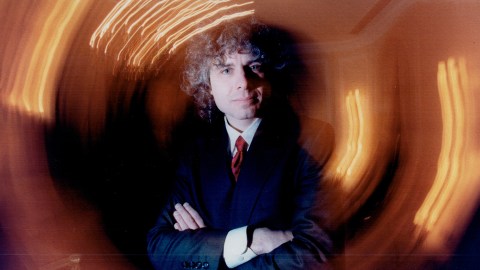Steven Pinker: Linguistics as a window to understanding the brain

- According to psychologist Steven Pinker, “language is a window to the human mind.”
- Language reveals that our long-term memory storage is sizable, but that we mostly remember in abstractions. It also shows that the human mind has the ability to be infinitely creative, and that we are likely born with an ingrained recipe for language learning.
- “Language is a miracle of the natural world,” Pinker told Big Think in 2012, “because it allows us to exchange an unlimited number of ideas using a finite set of mental tools.”
Steven Pinker, the Johnstone Family Professor of Psychology at Harvard University, has been studying language for more than four decades, yet he’s not particularly interested in language per se. Instead, he views it “as a window to the human mind.”
“It’s the trait that most conspicuously distinguishes humans from other species,” he told Big Think in a popular lecture from 2012.
Complex language can be found in every single human society, in remarkable diversity. We take it for granted, but it’s truly miraculous. Just think: Through coordinated hisses, grunts, and squeaks, ideas are shared. People will sit and listen for hours — in rapt attention — to another human simply talking, and be transported.
“I could cause you to be thinking thoughts about a vast array of topics, anything from the latest developments in your favorite reality show to theories of the origin of the universe,” Pinker said.
In his lecture, Pinker made clear what language is not. It is not writing. While all cultures have language, not all have transcribed it. Language is also not thought, exactly. Babies can think and communicate without speech. Moreover, many of us frequently think in visuals, not in words written on a mental chalkboard.
At its most essential, language is a system of words, rules, and interfaces (our mouth, ears, and brain), Pinker said.
Now, what does it reveal about our mind?
For one, it suggests that we mostly remember in gists and abstractions. Imagine sitting down for a lengthy lecture, Pinker described.
“If I were to ask you to reproduce any sentence that I have uttered, you would be incapable of doing so. What sticks in memory is far more abstract than the actual sentences, something that we can call meaning or content or semantics.”
Language also showcases the sizable capacity of human long-term memory.
“A typical high school graduate has a vocabulary of around 60,000 words, which works out to a rate of learning of about one new word every two hours starting from the age of one,” Pinker said.
Third, language reveals the human mind’s near-infinite creativity.
“Except for a small number of clichéd formulas, just about any sentence that you produce or understand is a brand new combination produced for the first time perhaps in your life, perhaps even in the history of the species,” Pinker noted. “It shows that when we know a language, we haven’t just memorized a very long list of sentences, but rather have internalized a grammar or algorithm or recipe for combining elements into brand new assemblies.”
This internalized algorithm may be present in the mind from birth, though the idea is controversial. Influential linguist Noam Chomsky is the chief architect behind the theory. Pinker explained his reasoning.
“If you look at what goes into the ears of a child and look at the talent they end up with as adults, there is a big chasm between them that can only be filled in by assuming that the child has a lot of knowledge of the way that language works already built in.”
It’s a bit of a gaps-based argument, but it is evinced by neuroscientific and psychological work in the lab. Furthermore, the notion is seductive because it feels right, especially to any parent who’s been amazed at how their young child learned language by seemingly just absorbing it from their audible surroundings.
So where does all of this leave us? It leaves us in awe of the grand power of language and the ability of the human mind to wield it.
“Language is a miracle of the natural world,” Pinker concluded, “because it allows us to exchange an unlimited number of ideas using a finite set of mental tools. Those mental tools comprise a large lexicon of memorized words and a powerful mental grammar that can combine them.”





